| Listing 1 - 10 of 538 | << page >> |
Sort by
|
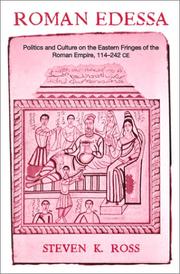
ISBN: 1280111739 9786610111732 1134660634 0203991974 9781134660636 9780203991978 6610111731 9780415187879 0415187877 0415187877 9781280111730 9781134660582 9781134660629 9780415620093 1134660626 Year: 2001 Publisher: London Routledge
Abstract | Keywords | Export | Availability | Bookmark
 Loading...
Loading...Choose an application
- Reference Manager
- EndNote
- RefWorks (Direct export to RefWorks)
Roman Edessa offers a comprehensive and erudite analysis of the ancient city of Edessa (modern day Urfa, Turkey), which constituted a remarkable amalgam of the East and the West. Among the areas explored are:* the cultural life and antecedents of Edessa* Edessene religion* the extent of the Hellenization at Edessa before the advent of Christianity* the myth of an exchange of letters between a King Abgar and Jesus.
Romans --- Ethnology --- Italic peoples --- Latini (Italic people) --- Şanlıurfa (Turkey) --- Riha (Turkey) --- Ruha (Turkey) --- Orfa (Turkey) --- Orhāy (Turkey) --- Uṛhay (Turkey) --- al-Ruhā (Turkey) --- Urfah (Turkey) --- אורפה (טורקיה) --- Urfa (Turkey) --- History. --- Sanlurfa (Turkey)

ISBN: 0415187877 9780415187879 Year: 2001 Publisher: London: Routledge,
Abstract | Keywords | Export | Availability | Bookmark
 Loading...
Loading...Choose an application
- Reference Manager
- EndNote
- RefWorks (Direct export to RefWorks)
Roman Edessa offers a comprehensive and erudite analysis of the ancient city of Edessa (modern day Urfa, Turkey), which constituted a remarkable amalgam of the East and the West. Among the areas explored are: * the cultural life and antecedents of Edessa * Edessene religion * the extent of the Hellenization at Edessa before the advent of Christianity * the myth of an exchange of letters between a King Abgar and Jesus.
Romans --- Şanlıurfa (Turkey) --- History --- -Ethnology --- Italic peoples --- Latini (Italic people) --- Sanliurfa (Turkey) --- -History --- -Sanliurfa (Turkey) --- Ethnology --- Şanlıurfa (Turkey) --- Riha (Turkey) --- Ruha (Turkey) --- Orfa (Turkey) --- Orhāy (Turkey) --- Uṛhay (Turkey) --- al-Ruhā (Turkey) --- Urfah (Turkey) --- אורפה (טורקיה) --- Urfa (Turkey) --- History. --- Turkey --- Romans - Turkey - Şanlıurfa --- Şanlıurfa (Turkey) - History
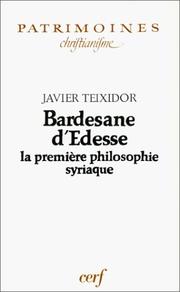
ISBN: 2204044997 9782204044998 Year: 1992 Volume: *5 Publisher: Paris: Cerf,
Abstract | Keywords | Export | Availability | Bookmark
 Loading...
Loading...Choose an application
- Reference Manager
- EndNote
- RefWorks (Direct export to RefWorks)
Bardesanes, --- Şanlıurfa (Turkey) --- 276 =923 BARDESANES EDESSANUS --- Syrische patrologie--BARDESANES EDESSANUS --- Bardesanes --- Edessa (Turkey) --- Bar-Daiṣān, --- Bardaiṣan, --- Edessa, Bardaiṣan of, --- Bardesane, --- Bar Daiçan, --- Daiçan, Bar, --- Bardesan, --- Daiṣān, Bar-, --- Riha (Turkey) --- Ruha (Turkey) --- Orfa (Turkey) --- Orhāy (Turkey) --- Uṛhay (Turkey) --- al-Ruhā (Turkey) --- Urfah (Turkey) --- אורפה (טורקיה) --- Urfa (Turkey) --- Bardesanes edessanus --- Bar-Daiṣān --- Bardesanes, - 154-222
Book
ISBN: 9789004173477 9004173471 Year: 2008 Volume: 18 Publisher: Leiden: Brill,
Abstract | Keywords | Export | Availability | Bookmark
 Loading...
Loading...Choose an application
- Reference Manager
- EndNote
- RefWorks (Direct export to RefWorks)
Syriac language --- Jacob, --- Şanlıurfa (Turkey) --- Civilization --- 221.014*2 --- Oud Testament: geschiedenis van grondtekst en oude vertalingen --- Syriac language. --- Şanlıurfa (Turkey) --- Civilization. --- 221.014*2 Oud Testament: geschiedenis van grondtekst en oude vertalingen --- Semitic languages, Northwest --- Aramaic language --- Edessa, Jacob of, --- Edessa, Jakob von, --- Edessa, James of, --- Edessa, Jaʻqōb von, --- Edesse, Jacques d', --- Edesseni, Iacobus, --- Edessenus, Jacobus, --- Iacobus Edesseni, --- Jacobus Edessenus, --- Jacques, --- Jakob, --- James, --- Jaʻqōb, --- Yaʻaḳov, --- Yaʻḳov, --- Yâḳûb, --- يعقوب الرهاوي، --- Riha (Turkey) --- Ruha (Turkey) --- Orfa (Turkey) --- Orhāy (Turkey) --- Uṛhay (Turkey) --- al-Ruhā (Turkey) --- Urfah (Turkey) --- אורפה (טורקיה) --- Urfa (Turkey) --- Jacob, - of Edessa, - approximately 640-708
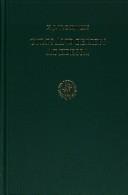
ISBN: 9004060502 9004295623 9789004060500 9789004295629 Year: 1980 Volume: 82 Publisher: Leiden: Brill,
Abstract | Keywords | Export | Availability | Bookmark
 Loading...
Loading...Choose an application
- Reference Manager
- EndNote
- RefWorks (Direct export to RefWorks)
Cults --- anliurfa (Turkey) --- Religion --- Şanlıurfa (Turkey) --- 299.23 --- 292 --- 291.09565 --- Oud-syrische godsdiensten. Ugaritische godsdienst --- Godsdiensten van Grieken en Romeinen. Klassieke mythologie --- Religion Comparative religion East central Turkey --- Sanliurfa (Turkey) --- -Religion --- 299.23 Oud-syrische godsdiensten. Ugaritische godsdienst --- Alternative religious movements --- Cult --- Cultus --- Marginal religious movements --- New religions --- New religious movements --- NRMs (Religion) --- Religious movements, Alternative --- Religious movements, Marginal --- Religious movements, New --- Religions --- Sects --- Riha (Turkey) --- Ruha (Turkey) --- Orfa (Turkey) --- Orhāy (Turkey) --- Uṛhay (Turkey) --- al-Ruhā (Turkey) --- Urfah (Turkey) --- אורפה (טורקיה) --- Urfa (Turkey) --- Religion. --- Cults. --- Religion, Primitive --- Atheism --- Irreligion --- Theology --- Turkey --- Cults - Turkey - Şanlıurfa --- Şanlıurfa (Turkey) - Religion
Book
ISBN: 3769614836 9783769614831 Year: 1977 Volume: 1977, 2 Publisher: München: Bayerische Akademie der Wissenschaften,
Abstract | Keywords | Export | Availability | Bookmark
 Loading...
Loading...Choose an application
- Reference Manager
- EndNote
- RefWorks (Direct export to RefWorks)
Architecture, Byzantine --- Church architecture --- Şanlıurfa (Turkey) --- Diyarbakir, Turkey (City) --- Antiquities --- -Byzantine architecture --- Byzantine revival (Architecture) --- Şanlıurfa (Turkey) --- Antiquities. --- -Architecture, Byzantine --- Ecclesiastical architecture --- Rood-lofts --- Christian art and symbolism --- Religious architecture --- Architecture, Gothic --- Church buildings --- Byzantine architecture --- Riha (Turkey) --- Ruha (Turkey) --- Orfa (Turkey) --- Orhāy (Turkey) --- Uṛhay (Turkey) --- al-Ruhā (Turkey) --- Urfah (Turkey) --- אורפה (טורקיה) --- Urfa (Turkey) --- Architecture, Byzantine - Turkey - Şanlıurfa --- Church architecture - Turkey - Şanlıurfa --- Architecture, Byzantine - Turkey - Diyarbakir (City) --- Church architecture - Turkey - Diyarbakir (City) --- Şanlıurfa (Turkey) - Antiquities --- Diyarbakir, Turkey (City) - Antiquities
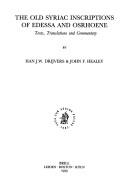
ISBN: 9004112847 9004294082 Year: 1999 Volume: 42 Publisher: Leiden, Netherlands ; Boston : Brill,
Abstract | Keywords | Export | Availability | Bookmark
 Loading...
Loading...Choose an application
- Reference Manager
- EndNote
- RefWorks (Direct export to RefWorks)
This volume contains all the known Old Syriac inscriptions from Edessa and the area around Osrhoene in Northern Mesopotamia from the first three centuries C.E., the number of which has substantially increased over the last decades. The texts are given in estrangelo script and are accompanied by an extensive philological and historical commentary. The originals are presented in photographs and line drawings. The volume also contains chapters on the script of these inscriptions, on the language and on the history and culture of Edessa. Two appendices offer the texts of three parchments written in Syriac and originating from the same area, and of known but still unpublished inscriptions. The book concludes with indices of words and proper names, which are complement to the Dictionary of the North-West Semitic Inscriptions ( Brill , 1995), and with a full bibliography.
Inscriptions, Syriac --- Inscriptions syriaques --- Şanlıurfa (Turkey) --- Osroëne (Ancient kingdom) --- Şanlıurfa (Turquie) --- Antiquities --- Civilization --- Antiquités --- Civilisation --- 930.271 =923 --- -Inscriptions, Syriac --- -492.311 --- Syriac inscriptions --- Epigrafie--=taal--Syrisch --- Languages Afro-Asiatic Semitic Eastern Aramaic languages Syriac Writing systems --- Osroene (Ancient kingdom) --- -Sanliurfa (Turkey) --- Şanlıurfa (Turkey) --- Osroëne (Ancient kingdom) --- 930.271 =923 Epigrafie--=taal--Syrisch --- 492.311 --- Riha (Turkey) --- Ruha (Turkey) --- Orfa (Turkey) --- Orhāy (Turkey) --- Uṛhay (Turkey) --- al-Ruhā (Turkey) --- Urfah (Turkey) --- אורפה (טורקיה) --- Urfa (Turkey) --- Osrhoène (Ancient kingdom) --- Antiquities. --- Civilization. --- Inscriptions, Syriac. --- Barbarism --- Auxiliary sciences of history --- Culture --- Archaeological specimens --- Artefacts (Antiquities) --- Artifacts (Antiquities) --- Specimens, Archaeological --- Material culture --- Archaeology --- Asia --- Turkey
Book
ISBN: 1282602241 9786612602245 9047426932 9789047426936 9789004173477 9004173471 Year: 2008 Publisher: Leiden Boston Brill
Abstract | Keywords | Export | Availability | Bookmark
 Loading...
Loading...Choose an application
- Reference Manager
- EndNote
- RefWorks (Direct export to RefWorks)
Jacob of Edessa (c.640-708) is considered the most learned Christian of the early days of Islam. In all fifteen contributions to this volume, written by prominent specialists, the interaction between Christianity, Judaism, and the new religion is an important issue. The articles discuss Jacob’s biography as well as his position in early Islamic Edessa, and give a full picture of the various aspects of Jacob of Edessa’s life and work as a scholar and clergyman. Attention is paid to his efforts in the fields of historiography, correspondence, canon law, text and interpretation of the Bible, language and translation, theology, philosophy, and science. The book, which marks the 1300th anniversary of Jacob’s death, also contains a bibliographical clavis.
Syriac language. --- Semitic languages, Northwest --- Aramaic language --- Jacques --- Jakob --- Jacob, --- Edessa, Jacob of, --- Edessa, Jakob von, --- Edessa, James of, --- Edessa, Jaʻqōb von, --- Edesse, Jacques d', --- Edesseni, Iacobus, --- Edessenus, Jacobus, --- Iacobus Edesseni, --- Jacobus Edessenus, --- Jacques, --- Jakob, --- James, --- Jaʻqōb, --- Yaʻaḳov, --- Yaʻḳov, --- Yâḳûb, --- يعقوب الرهاوي، --- Şanlıurfa (Turkey) --- Riha (Turkey) --- Ruha (Turkey) --- Orfa (Turkey) --- Orhāy (Turkey) --- Uṛhay (Turkey) --- al-Ruhā (Turkey) --- Urfah (Turkey) --- אורפה (טורקיה) --- Urfa (Turkey) --- Civilization. --- Syriac language --- Jacob, - of Edessa, - approximately 640-708 --- Şanlıurfa (Turkey) - Civilization --- Sanlurfa (Turkey)
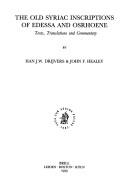
ISBN: 9789004294080 9789004112841 9004112847 9004294082 Year: 1999 Volume: 42 Publisher: Leiden: Brill,
Abstract | Keywords | Export | Availability | Bookmark
 Loading...
Loading...Choose an application
- Reference Manager
- EndNote
- RefWorks (Direct export to RefWorks)
This volume contains all the known Old Syriac inscriptions from Edessa and the area around Osrhoene in Northern Mesopotamia from the first three centuries C.E., the number of which has substantially increased over the last decades. The texts are given in estrangelo script and are accompanied by an extensive philological and historical commentary. The originals are presented in photographs and line drawings. The volume also contains chapters on the script of these inscriptions, on the language and on the history and culture of Edessa. Two appendices offer the texts of three parchments written in Syriac and originating from the same area, and of known but still unpublished inscriptions. The book concludes with indices of words and proper names, which are complement to the Dictionary of the North-West Semitic Inscriptions ( Brill , 1995), and with a full bibliography.
Inscriptions, Syriac - Turkey - Sanlurfa. --- Inscriptions, Syriac - Osroene (Ancient kingdom) --- Inscriptions, Syriac --- Inscriptions syriaques --- Şanlıurfa (Turkey) --- Osroëne (Ancient kingdom) --- Şanlıurfa (Turquie) --- Antiquities --- Civilization --- Antiquités --- Civilisation --- 492.311 --- 930.271 =923 --- 930.271 =923 Epigrafie--=taal--Syrisch --- Epigrafie--=taal--Syrisch --- Syriac inscriptions --- Languages Afro-Asiatic Semitic Eastern Aramaic languages Syriac Writing systems --- Riha (Turkey) --- Ruha (Turkey) --- Orfa (Turkey) --- Orhāy (Turkey) --- Uṛhay (Turkey) --- al-Ruhā (Turkey) --- Urfah (Turkey) --- אורפה (טורקיה) --- Urfa (Turkey) --- Osrhoène (Ancient kingdom) --- Antiquities. --- Civilization. --- Şanlıurfa (Turkey) --- Osroëne (Ancient kingdom) --- Inscriptions, Syriac. --- Asia --- Turkey
Book
ISBN: 9789004361850 9004361855 9789004362581 9004362584 Year: 2018 Volume: 146 Publisher: Leiden: Brill,
Abstract | Keywords | Export | Availability | Bookmark
 Loading...
Loading...Choose an application
- Reference Manager
- EndNote
- RefWorks (Direct export to RefWorks)
In Ephrem der Syrer und Basilios der Große, Justinian und Edessa, Nestor Kavvadas examines the Syriac “Life” of Saint Ephrem, composed in Edessa at the time when the Syriac Miaphysite movement was opposing Justinian’s pro-Chalcedonian politics, and compares it with several earlier Greek Cappadocian hagiographies about Ephrem and Basil of Caesarea, who is presented almost as Ephrem’s patron in the latter’s “Life”. The author shows that while the Greek hagiographies were meant to (re)claim Ephrem as a Father of the (Chalcedonian) Byzantine Orthodox Church, Ephrem’s Syriac “Life” was part of an attempt by the Syriac Miaphysite movement to claim exclusive rights on both Ephrem and Basil as representatives of the entire legacy of the Church Fathers. Then, the author points out how the “Life”, once de-coded, can in turn shed light on its historical setting.
Christian literature, Syriac --- Monophysites --- 276 =923 EPHRAEM SYRUS --- 276 =75 BASILIUS SELEUCIENSIS --- 276 =75 BASILIUS SELEUCIENSIS Griekse patrologie--BASILIUS SELEUCIENSIS --- 276 =75 BASILIUS SELEUCIENSIS Patrologie grecque--BASILIUS SELEUCIENSIS --- Griekse patrologie--BASILIUS SELEUCIENSIS --- Patrologie grecque--BASILIUS SELEUCIENSIS --- 276 =923 EPHRAEM SYRUS Patrologie syrienne--EPHRAEM SYRUS --- 276 =923 EPHRAEM SYRUS Syrische patrologie--EPHRAEM SYRUS --- Patrologie syrienne--EPHRAEM SYRUS --- Syrische patrologie--EPHRAEM SYRUS --- Christian heresies --- Oriental Orthodox churches --- Syriac Christian literature --- Syriac literature --- History and criticism --- History --- Ephraem, --- Basil, --- Justinian --- Jesus Christ --- Christ --- Cristo --- Jezus Chrystus --- Jesus Cristo --- Jesus, --- Jezus --- Christ, Jesus --- Yeh-su --- Masīḥ --- Khristos --- Gesù --- Christo --- Yeshua --- Chrystus --- Gesú Cristo --- Ježíš --- Isa, --- Nabi Isa --- Isa Al-Masih --- Al-Masih, Isa --- Masih, Isa Al --- -Jesus, --- Jesucristo --- Yesu --- Yeh-su Chi-tu --- Iēsous --- Iēsous Christos --- Iēsous, --- Kʻristos --- Hisus Kʻristos --- Christos --- Jesuo --- Yeshuʻa ben Yosef --- Yeshua ben Yoseph --- Iisus --- Iisus Khristos --- Jeschua ben Joseph --- Ieso Kriʻste --- Yesus --- Kristus --- ישו --- ישו הנוצרי --- ישו הנצרי --- ישוע --- ישוע בן יוסף --- المسيح --- مسيح --- يسوع المسيح --- 耶稣 --- 耶稣基督 --- 예수그리스도 --- Jíizis --- Yéshoua --- Iėsu̇s --- Khrist Iėsu̇s --- عيسىٰ --- Justinien, --- Justinian, --- Justinianus, Flavius Anicius Julianus, --- Justinianus --- Giustiniano, --- Iustinianus, Flavius Petrus Sabbatius, --- I︠U︡stinian, --- I︠U︡stinian, Flaviĭ, --- Barsegh, --- Basile, --- Basileios, --- Basili, --- Basilio, --- Basilius Caesariensis, --- Basilius Cesariensis, --- Basilius, --- Bāsīliyūs, --- Bazyli, --- Magnus Basilius, --- Qiddīs Bāsīliyūs al-Kabīr, --- Vasile, --- Vasileios, --- Vasiliĭ, --- Vasilije, --- Vasyliĭ, --- Afrām, --- Afrem, --- Aphrem, --- Aprem, Mar, --- Effrem, --- Efrem, --- Ephraem Syrus, --- Ephraim, --- Ephrem, --- Éphrem, --- Epʻrem, --- Epʻrem Khori, --- Epʻrem Khuri, --- Ifram, --- Ifrām, --- Афрем, --- Ефрем, --- افرام، --- Natures --- History of doctrines --- Council of Chalcedon --- Council of Chalcedon. --- Chalcedon, Council of, --- Concilio di Calcedonia --- Konzil von Chalkedon --- Concilium Chalcedonense --- Syriac life of Ephrem. --- Şanlıurfa (Turkey) --- Riha (Turkey) --- Ruha (Turkey) --- Orfa (Turkey) --- Orhāy (Turkey) --- Uṛhay (Turkey) --- al-Ruhā (Turkey) --- Urfah (Turkey) --- אורפה (טורקיה) --- Urfa (Turkey) --- Church history. --- 11.53 Eastern Churches. --- 18.70 Semitic languages and/or literature. --- Christian literature, Syriac. --- Heiligenvita. --- Hypostatische Union. --- Kirchenpolitik. --- Konflikt. --- Kontroverse. --- Monophysites. --- Rechtgläubigkeit. --- History and criticism. --- Jesus Christ. --- 30-600. --- Byzantinisches Reich. --- Edessa. --- Turkey --- Şanlıurfa (Turkey) --- Person and offices --- عيسىٰ --- Юстиниан, --- Юстиниан, Флавий, --- Person and offices. --- History. --- Ephraem Syrus --- Basilius ep. Caesareae --- Ephraem, - Syrus, Saint, - 303-373 --- Basil, - Saint, Bishop of Caesarea, - approximately 329-379 --- Justinian - I, - Emperor of the East, - 483?-565 --- Jesus Christ - Person and offices --- Pseudo-Basil
| Listing 1 - 10 of 538 | << page >> |
Sort by
|

 Search
Search Feedback
Feedback About UniCat
About UniCat  Help
Help News
News